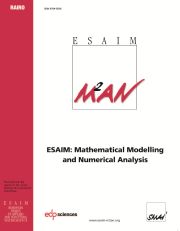Article contents
On a variant of random homogenization theory: convergence of the residual process and approximation of the homogenized coefficients
Published online by Cambridge University Press: 07 February 2014
Abstract
We consider the variant of stochastic homogenization theory introduced in [X. Blanc, C. Le Bris and P.-L. Lions, C. R. Acad. Sci. Série I 343 (2006) 717–724.; X. Blanc, C. Le Bris and P.-L. Lions, J. Math. Pures Appl. 88 (2007) 34–63.]. The equation under consideration is a standard linear elliptic equation in divergence form, where the highly oscillatory coefficient is the composition of a periodic matrix with a stochastic diffeomorphism. The homogenized limit of this problem has been identified in [X. Blanc, C. Le Bris and P.-L. Lions, C. R. Acad. Sci. Série I 343 (2006) 717–724.]. We first establish, in the one-dimensional case, a convergence result (with an explicit rate) on the residual process, defined as the difference between the solution to the highly oscillatory problem and the solution to the homogenized problem. We next return to the multidimensional situation. As often in random homogenization, the homogenized matrix is defined from a so-called corrector function, which is the solution to a problem set on the entire space. We describe and prove the almost sure convergence of an approximation strategy based on truncated versions of the corrector problem.
Keywords
- Type
- Research Article
- Information
- ESAIM: Mathematical Modelling and Numerical Analysis , Volume 48 , Issue 2: Multiscale problems and techniques , March 2014 , pp. 347 - 386
- Copyright
- © EDP Sciences, SMAI, 2014
References
- 2
- Cited by




